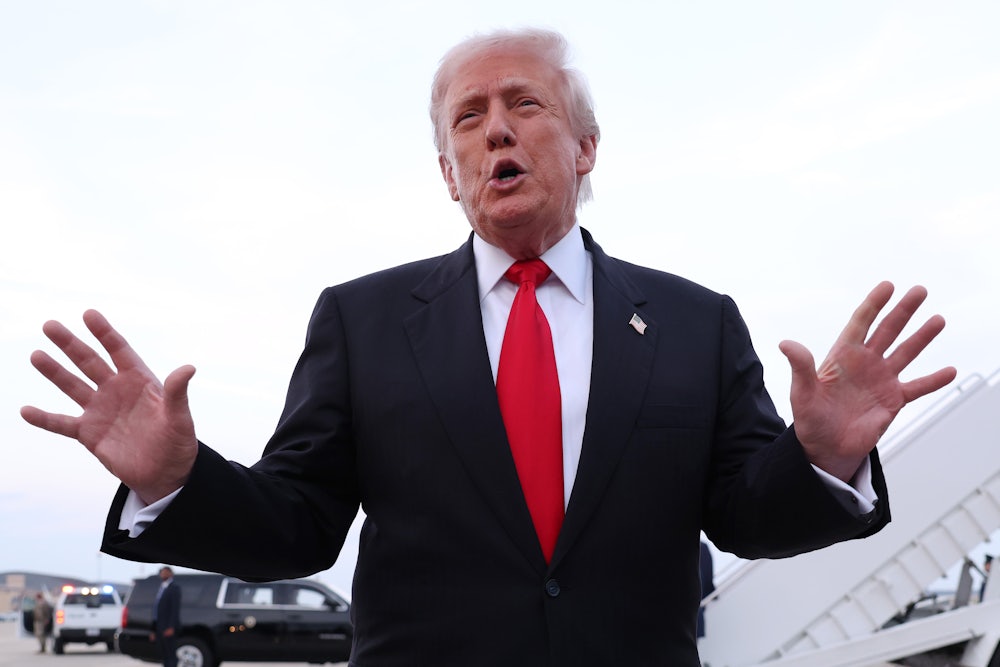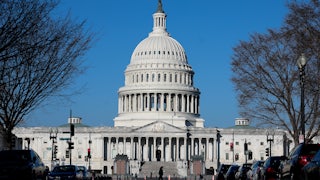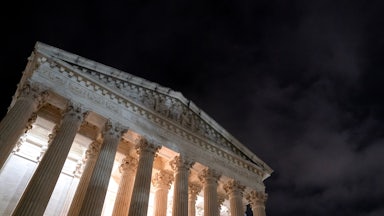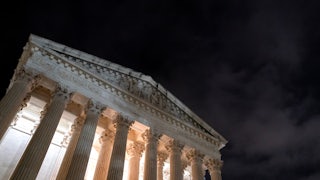House Speaker Mike Johnson is outraged—absolutely outraged—that Democrats dared to suggest in that viral video this week that military and intelligence professionals should be wary of following illegal orders. “That was a wildly inappropriate thing for so-called leaders in Congress to do,” Johnson told reporters. Shockingly, Johnson didn’t think it “inappropriate” for Trump to accuse those Democrats of sedition that’s “punishable by death.”
What’s been oddly absent from much of the coverage is any consideration of this question: Is it reasonable to fear that Trump or his top advisers actually are giving illegal orders to people in the military or intelligence services, or is it not reasonable to fear this? The answer is: Yes, of course it’s reasonable.
And guess who is standing in the way of serious fact-finding that might determine whether Trump is or is not doling out said illegal orders? Mike Johnson is. Because the GOP’s wholesale abdication of oversight is itself facilitating the issuing of potentially unlawful commands under cover of darkness.
The evidence that Trump or his top advisers really have been issuing illegal commands is quite strong.
First, NBC News reports that a top military lawyer linked to the unit carrying out Trump’s bombings of supposed drug smugglers in the Caribbean Sea believes they’re illegal. The lawyer was sidelined over his opposition to the strikes—which have now killed over 80 people—but many legal experts agree with him, not the administration.
They believe Trump—who claims inherent constitutional authority to defend the country with these strikes—has arrogated for himself the power to summarily execute civilians who simply are not meaningfully waging war against our country. There’s plenty of evidence that many of the dead weren’t even smuggling drugs here to begin with.
Heck, the Justice Department’s own lawyers have signaled concern that those carrying out these strikes are on shaky ground. A recent DOJ memo takes the gratuitous step of offering a preemptive legal defense of officials executing the bombings, which experts say is unusual and indicates worry about their legal precarity later.
Want more? The top official overseeing the bombings recently resigned with no public explanation, reportedly due to concerns about them. Democrats want the official, Adm. Alvin Holsey, to answer under oath whether he feared the strikes are illegal. The Pentagon has stood in the way, and Republicans don’t appear willing to push for Holsey to appear. Johnson could allow Congress to determine whether officials fear Trump’s orders have landed them in legal jeopardy. Naturally, he doesn’t want to.
Or what about the long-running court battle over whether the Department of Homeland Security—an agency with a big intelligence function—unlawfully deported scores of migrants under the Alien Enemies Act last spring, in direct defiance of a court order? An appeals court just allowed a lower court to keep examining this question: As David Kurtz explains, this shows that the inquiry into whether the administration defied the courts is a legally legitimate one.
Which means that, when someone in the White House ordered those planes to keep deporting those migrants to El Salvador after a court tried to stop it, this order really might have been delivered in criminal contempt of court.
Or what about that fellow named Kilmar Ábrego García, who was deported by DHS to a gulag in El Salvador after an admitted “error” violating a judge’s ruling that he couldn’t be deported there? In April, the Supreme Court directed Trump to “facilitate” Ábrego García’s return. For many weeks the administration refused, though it ultimately relented.
Who in the White House ordered DHS to drag its feet on this? Stephen Miller? Trump himself? Did this functionally direct officials to engage in unlawful conduct? These are obviously reasonable questions. And the administration has been defying the courts in other ways all throughout the Ábrego García saga.
In that video cut by the six Democrats, they broadly warn that it’s a very tough time for “public servants.” And on other fronts, Trump’s orders are pushing public servants into legally dubious territory.
Recall that Trump has openly commanded his DOJ to bring prosecutions against Democratic enemies, including New York Attorney General Letitia James and California Senator Adam Schiff. This came after career prosecutors resigned or leaked word of stiff internal resistance over those cases. Resignations or leaks like this are clear signals that officials believe something deeply suspect, if not illegal, is going on. Trump now has handpicked prosecutor Lindsey Halligan bringing cases (however ineptly) against Schiff and another foe, former FBI Director James Comey.
In ordering these prosecutions, is Trump giving illegal orders? Former prosecutor Kristy Parker says that depending on specifics, bad-faith orders to prosecute foes while knowing the facts don’t warrant it can be unlawful. They might violate the target’s constitutional rights or run afoul of a federal statute barring officials acting under color of law from willfully depriving people of those rights, Parker says, which could apply to both the giver and the executor of the order.
“Just following orders” is “not a lawful defense,” Parker told me. “If the order is unlawful, you can’t follow it, and you’ll be in violation of the law yourself if you do,” she said, though it’s often unclear how legally vulnerable underlings would be later.
Here’s the key point: From Trump’s boat bombings to his deportations to his demands for corrupt prosecutions, a through line links all these examples. In every conceivable way, Donald Trump demands fealty to himself—and to his whims, wholly untethered to law—over fealty to federal officials’ oaths of office. This is visible everywhere: Donald Moynihan powerfully illustrates how the FBI’s professionalism has succumbed to Trump’s “personalist rule,” as those who take their responsibilities as public servants seriously are belittled, purged, and persecuted.
That’s the story writ large, and in that context, the video from Democrats is an act of patriotism. It lets people throughout the government know that even if the GOP has wholly abdicated oversight, some lawmakers remain bound to the law, are watching closely, and have the backs of officials who fear that Trump’s orders are putting them in danger.
This is particularly germane when it comes to the military. As legal scholar Josh Chafetz told me, while the president is commander in chief, Congress has regulatory authorities over the military, and “military discipline is squarely within Congress’s purview.” That’s arguably what Democrats did with this video: They are doing their best to offer oversight even as Republicans will not. And they should keep it up. Big public gestures like this can force big public arguments, and the debate over whether Trump is or is not giving illegal orders is one we need to have.
So when Mike Johnson feigns horror over this Democratic intervention, the correct answer is: Are you effing kidding me? Given all we’ve seen, of course it’s reasonable to warn that Trump very well may be giving illegal orders. You may not want this debate, Speaker Johnson, but the rest of us do, and we’re damn well going to have it—whether you like it or not.






